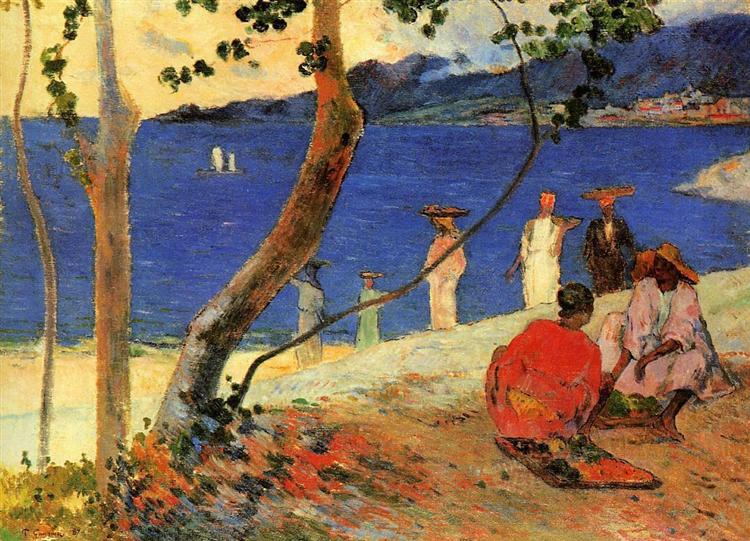תיאור
Paul Gauguin's "A Seashore" created in 1887 is a fascinating depiction of the painter's artistic quest, bringing together his interest in simplicity and spirituality in art. Gauguin, a pioneer of post-impressionism, is known for his eagerness to explore color and form beyond their naturalistic representation, and this work is no exception. In "A Seashore," the viewer is invited to immerse themselves in a vibrant, almost dreamlike landscape that reveals Gauguin's mastery in the manipulation of color and space.
The composition is marked by a sea that unfolds on a horizontal canvas, dominating the background with shades of blue that contrast notably with the intense brushstrokes in shades of green and gold that represent the sand and vegetation. The beach becomes a space of transition, a place where natural elements meet in a dynamic balance. The warm tones that caress the surface of the sand provide a feeling of warmth, evoking both sunlight and the feeling of being present in the place.
As for the human figure, unlike many of his later works, in "A Seashore" we find a barely suggested representation of the human presence, which could be considered characteristic of the artist's stage in this period. The absence of clearly defined figures invites contemplation and allows the viewer to immerse themselves in an introspective experience, focusing more on the connection between the natural environment and the spirit of the observer than on the human narrative. It is an echo of the artist himself, who is in constant search of his identity and his relationship with the world around him.
The use of colour in this work is particularly innovative. Gauguin eschews the more subtle and naturalistic colour palette of the Impressionists and instead opts for a more radical approach. The colours are not necessarily representative of reality, but rather communicate sensations, feelings and the artist's interiority. This marks a move towards a more symbolic aesthetic, where colour is used as a vehicle to express emotion and mood rather than as a descriptive element.
Gauguin's style, characterized by its rejection of mere representation and its interest in the essence of things, is effectively manifested here. His later trip to Tahiti would further push these explorations, but in "A Seashore," we see the first signs of his interest in distancing himself from Impressionist influence. This work is situated at a crossroads where Impressionism is transformed under the lens of a more personal and symbolic expression.
In conclusion, “A Seashore” is a work that not only captures the beauty of a seascape, but also reveals the artist’s introspective process in his relationship with color and form. Through his post-impressionist style, Gauguin invites us to explore not only a place, but also a shared experience that transcends mere visual representation, a quality that defines his legacy and his impact on the development of modern art.
KUADROS ©, a famous painting on your wall.
Hand-made oil painting reproductions, with the quality of professional artists and the distinctive seal of KUADROS ©.
Painting reproduction service with satisfaction guarantee. If you are not completely satisfied with the replica of your painting, we will refund 100% of your money.

